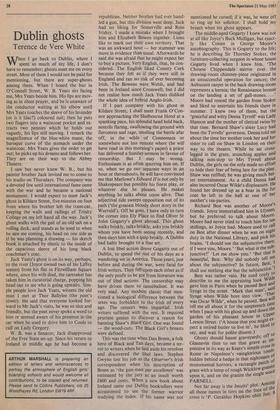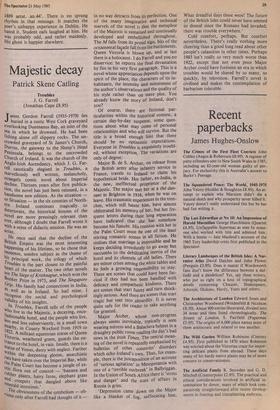Dublin ghosts
Terence de Vere White
Wien I go back to Dublin, where I spent so much of my life, I don't have to remember; ghosts meet me on every street. Most of them I would not be paid for mentioning, but there are super-ghosts among them. When I board the bus in O'Connell Street, W. B. Yeats sits facing me, Mrs Yeats beside him. His lips are mov- ing as in silent prayer, and he is unaware of the conductor waiting at his elbow until Mrs Yeats touches the sleeve of his lavender (or is it lilac?) coloured suit; then he puts two fingers into a waistcoat pocket and ex- tracts two pennies which he holds out vaguely, his lips still moving. I remark the magnificence of the blue-white mane, the baroque curve of the stomach under the waistcoat. Mrs Yeats gives the order to get out; he picks up his dreams and follows her. They are on their way to the Abbey Theatre.
I saw but never knew W. B., but his painter brother Jack invited me to come to his studio on Thursdays. The company was a devoted few until international fame came with the war and he became a national monument. I would expect to meet Jack's ghost in Kildare Street, five minutes on foot from where his brother left the tram-car, keeping the walls and railings of Trinity College on my left hand all the way. Jack's ghost walks with the gait of an old salt on a rolling deck, and stands as he used to when he saw me coming, his head on one side as if he was planning a drawing — his sketch book is attached by elastic to the inside of the capacious sleeve of his long black coachman's coat.
Jack Yeats's ghost is on its way, perhaps, to the river (Joyce owned two of his Liffey scenes) from his flat in Fitzwilliam Square where, since his wife died, the caretaker has taken him in curatorial charge, popping his head out to see who is going upstairs. Sim- ple people love Jack Yeats, witness the old man I met at Thor Ballylee (the poet's tower). He said that everyone looked for- ward to Mr Jack's visits, he was so nice and friendly, but the poet never spoke a word to him or seemed aware of his presence in the car when he used to drive him to Coole to call on Lady Gregory.
W. B. was a Senator; Jack disapproved of the Free State set-up. Since his return to Ireland in middle age he had become a republican. Neither brother had ever hand- led a gun, but this division went deep. Jack had no liking for Somerville and Ross Irishry. I made a mistake when I brought him and Elizabeth Bowen together. Lions like to mark out their own territory. That was an awkward hour — her stammer was more in evidence than usual. Afterwards he said she was afraid that he might expect her to buy a picture. Very English, that, he con- sidered. The English liked County Cork because they felt as if they were still in England and ran no risk of ever becoming Irish. The Bowens were Welsh, and had been in Ireland since Cromwell; but I did not realise how much Jack Yeats disliked the whole idea of hybrid Anglo-Irish.
If I part company with his ghost in Kildare Street, I shall meet Frank O'Con- nor approaching the Shelbourne Hotel at a spanking pace, his splendid head held back, nostrils flaring, swallowing the ground with fierceness and rage, smelling the battle afar off, in the wilds of Connemara or somewhere not less remote where (he will have read in this morning's paper) a priest has delivered a Sunday sermon in favour of censorship. But I may be wrong. Enthusiasm is as often spurring him on. If so, when we go our separate ways in an hour or thereabouts, he will have convinced me that Marlowe's Edward II is not only by Shakespeare but possibly his finest play, or whatever else he pleases. He makes anything he talks about come alive. That adjectival tide sweeps opposition out of its path (`the greatest bloody short story in the Wurruld'). Off he goes. I have only to turn the corner into Ely Place to find Oliver St John Gogarty's ghost abroad. This ghost walks briskly, talks briskly, asks you briskly whom you have been seeing recently, and then slays him with a quip briskly. A Dublin bad habit brought to a fine art.
A lost libel action drove Gogarty out of Dublin, to spend the rest of his days as a wandering wit in America. Those years, just before and during the war, were fatal for Irish writers. They fell upon each other as if the only profit to be got from literature was out of libel actions. The censorship may have driven them to cannibalism. It was very mad. Any modern classic that men- tioned a biological difference between the sexes was forbidden to the Irish of every age. The censors were impartial. Irish writers suffered with the rest. It required prurient genius to discover a reason for banning Shaw's Black Girl. One was found — the wood-cuts. The Black Girl's breasts were defined.
This was the time when Dan Breen, a folk hero of Black and Tan days, became a ter- ror to writers when he laid aside his revolver and discovered the libel laws. Stephen Gwynn lost his job as the Observer's Irish correspondent when his description of Breen as 'the gun-man par excellence' was estimated by the jury as an insult worth £600 and costs. When a new book about Ireland came out Dublin booksellers were accustomed to see the former warrior studying the index. If his name was not mentioned he cursed; if it was, he went off to ring up his solicitor. I shall hold my breath when his ghost appears.
The middle-aged Gogarty I knew was not at all like Joyce's Buck Mulligan, but exact- ly like Conan in George Moore's autobiography. This is Gogarty to the life; he is describing Sir Thornley Stoker, the furniture-collecting surgeon in whose house Gogarty lived when I knew him. 'The Chinese Chippendale mirror over the drawing-room chimney-piece originated in an unsuccessful operation for cancer; the Aubusson carpet in the back drawing-room represents a hernia; the Renaissance bronze on the landing a set of gall-stones....' Moore had rented the garden from Stoker and liked to entertain his friends there in summer. I knew two of them, but the `graceful and witty Deena Tyrrell' was Lady Hanson and the mother of clerical twins by that time. Bernard Shaw's sister Lucy had been the Tyrrells' governess. Deena told me about the time her mother took her and her sister to call on Shaw in London on their . way to the theatre. While he sat cross- legged in the grate, munching apples and talking non-stop to Mrs Tyrrell about Dublin, the girls on the sofa made no effort to hide their fear of being late for the play. Shaw was ruffled; he was giving much bet- ter entertainment. As a child Deena had also incurred Oscar Wilde's displeasure. He found her dressed up as a bear in the fur coat he left in the hall at one of her mother's tea-parties.
Richard Best was another of Moore's friends. Joyce immortalised him in Ulysses, but he preferred to talk about Moore. Moore had never tried to touch him for ten shillings, as Joyce had. Moore used to call on Best after dinner when he was on night duty in the National Library, and pick his brains. 'I should use the subjunctive there, if I were you, Moore.' But what is the sub- junctive?' Let me show you.' But that is beautiful, Best. Why did nobody tell rue about the subjunctive? In future, Best, I shall use nothing else but the subjunctive.') Best was rather vain. He used coy111 describe to me the appraising look Wil°,e, gave him in Paris when he passed Best art'', Synge in the street. 'Mark that man', salt Synge when Wilde bore into view. `Tha.„ was Oscar Wilde', when he passed. Best tell me all about it for the umpteenth time when I pace with his ghost up and down Crthegarden of his pleasant house in Uppr Leeson Street. CA house that you might ex- pect a retired butler to live in', he liked to say, and wait for polite dissent.)
Ghosts should haunt graveyards; off to Glasnevin then to see that grave as tin
ri pressive in its way as Keats's simple cross o ot Rome or Napoleon's vainglorious win, hidden behind a hedge in that nightmare 1, monumental horrors, a rectangle patch grass with a lump of rough Wicklow gra° e upon it, and on the granite the single word PARNELL. °rig Not far away is the Jesuits' plot. Al° all those names in tiers on the foot of Wo
cross is 'P. Geraldus Hopkins obiit ° 1889 aetat. an.44'. There is no sprung rhythm in that message. It matches the poet's unhappy experience in Dublin. He hated it. Student oafs laughed at him. He was probably odd, and rather maidenly. His ghost is happier elsewhere.











































 Previous page
Previous page